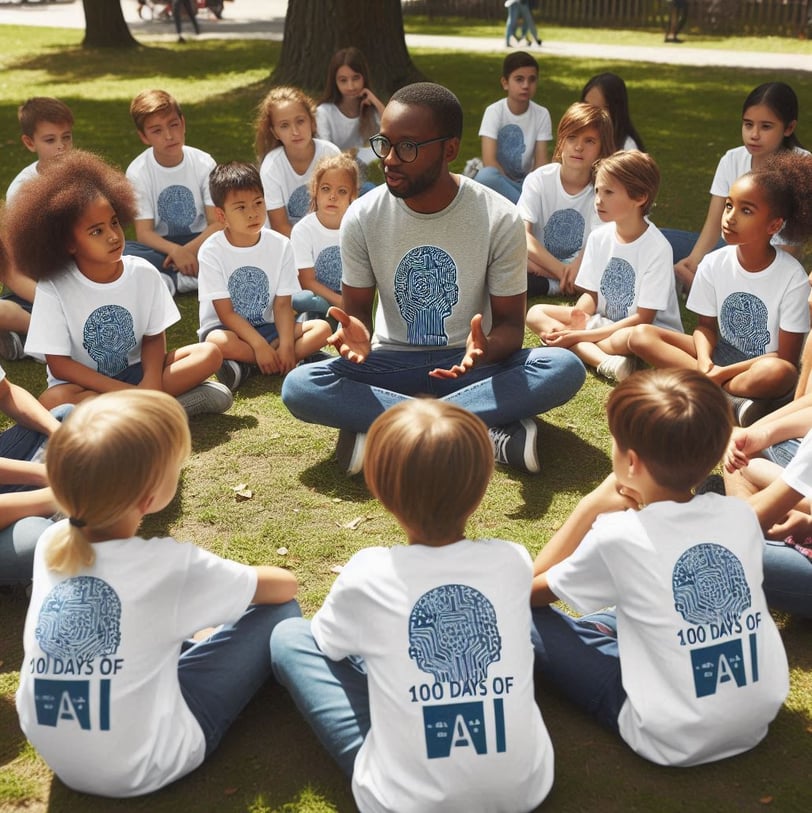Knowledge is the fuel that powers the train of progress.
100 Days Of AI For Kids
Why Parents Should Listen to This Series Personalized Content: This series is designed for parents who want to invest in their child’s future, giving them real-world examples of how AI and coding are transforming education. Actionable Insights: Every day, you’ll receive tips on how to introduce AI concepts in fun and easy ways, with activities you can do together with your child—no coding background needed! Prepared for Tomorrow: By engaging with this series, you’ll understand how AI can provide a head start for your child, offering them an advantage in education and career development. Engaging & Fun Learning: Our approach is to make learning fun. This series will show you how AI can be introduced through interactive games, projects, and activities that fit seamlessly into your child’s daily routine.
Srinivasan Ramanujam
9/18/20242 min read
Day 1: Introduction – Why AI Skills Matter for the Next Generation
In this first session, we’ll dive into why AI and coding are crucial skills for children to start learning early in life. The digital age is reshaping the future of work, and AI is at the heart of that transformation. Teaching your child AI now can prepare them for a world where almost every career will involve some level of technology. Here are a few compelling reasons why parents should pay attention:
1. AI is Everywhere
Real-Life Example: From voice assistants like Alexa and Siri to personalized recommendations on YouTube and Netflix, your child is already interacting with AI daily. Understanding how it works can spark their curiosity and help them see the potential of these technologies.
Takeaway: By learning AI, kids can go from passive users to creators of technology.
2. 21st Century Job Skills
Real-Life Example: According to the World Economic Forum, the top 10 skills of 2025 include critical thinking, problem-solving, and technological literacy—skills naturally developed through AI and coding education.
Takeaway: AI literacy is becoming as important as reading and math. Starting young gives your child an edge in future job markets.
3. Boosts Problem-Solving & Critical Thinking
Real-Life Example: Coding teaches children how to break complex problems into smaller parts, test solutions, and iterate when things don’t go as planned. A young coder might build a simple game, learning persistence and problem-solving along the way.
Takeaway: These skills translate to real-world problem-solving and critical thinking in everyday life, not just tech.
4. Creativity Meets Technology
Real-Life Example: With AI tools like Scratch or Blockly, kids can create animations, games, or even stories. They learn how to turn their creative ideas into reality through coding—combining logic and imagination in a fun, engaging way.
Takeaway: AI isn’t just for tech-savvy kids. It’s a creative playground where children can experiment with storytelling, art, and design.
5. Fosters Early Innovation
Real-Life Example: Imagine a 9-year-old building an app that helps track environmental changes in their neighborhood, or creating an AI-powered robot for a school project. These are real examples of how early learners are already innovating with AI today.
Takeaway: Starting early means your child is more likely to develop an entrepreneurial mindset and innovate in areas that matter to them.
Why Parents Should Listen to This Series
Personalized Content: This series is designed for parents who want to invest in their child’s future, giving them real-world examples of how AI and coding are transforming education.
Actionable Insights: Every day, you’ll receive tips on how to introduce AI concepts in fun and easy ways, with activities you can do together with your child—no coding background needed!
Prepared for Tomorrow: By engaging with this series, you’ll understand how AI can provide a head start for your child, offering them an advantage in education and career development.
Engaging & Fun Learning: Our approach is to make learning fun. This series will show you how AI can be introduced through interactive games, projects, and activities that fit seamlessly into your child’s daily routine.
What’s Next in the Series?
After this introduction, each day will focus on a specific aspect of AI or coding that can help your child grow. From hands-on projects to real-world examples, we’ll show you how to nurture their tech and problem-solving skills while keeping learning exciting.
Stay tuned for Day 2, where we’ll explore the perfect age to start teaching your child AI, with examples of how even toddlers can begin learning simple coding concepts through fun activities!






